How Do We Fix Climate Change & Restore Thriving?
5 Tips from Emergent Strategy – for Climate Justice + Social Justice
We are facing vast and complex challenges in the world. It’s easy to be discouraged, especially when we add in the effects of the pandemic. In the light of the new Intergovernmental Panel on Climate Change report calling for urgent action, we need ask: is it even possible to change? How?
That doubt echoes a key finding from the 2020 global Vitality Research: the emotional intelligence skill of Exercise Optimism is the key competency for fueling change (6sec.org/vitality). Meanwhile, the 2021 State of the Heart study shows that people with above-average scores on Exercise Optimism (>100) are 7x more likely to have high ‘Success’ scores – and this is true irrespective of age. Alarmingly, in 2020 people under 35 faced a large decline in optimism (6sec.org/soh).
At the 2021 Climate of Emotions retreat we heard that hard-fought-optimism from diverse, young voices from around the world. A common theme of these panels: Climate justice and social justice can only work together — it’s possible, but when we’re depleted, it doesn’t feel that way and we become less connected and less resilient… so emotions either fuel or block progress.
How Can Large Scale Change Emerge?
The retreat was inspired by adrienne maree brown’s principles of Emergent Strategy — combined with Six Seconds’ methods for emotional intelligence in change. In conventional strategy, we focus on “driving” change toward the future that one person or a small group sees. This is steeped in hierarchy and builds disconnection, rigidity, control. Are there other options? Some more inclusive strategies… such as “learning organization” and “agile” focus on responsive, adaptive approaches.
Emergent Strategy, as articulated by adrienne maree brown, is rooted in equitable relationships, the micro-growing to macro, and staying in the here-and-now. How can these principles apply to change management efforts today? Here are five tips grounded in the neuroscience of emotional intelligence (detailed below):
- Autopilot won’t take you somewhere new
- Attend to how external systems affect the people
- Change is an inside job
- Focus on the present to step toward the future
- Connection is more valuable than (the illusion of) control
If ALL change starts on the inside… then what’s our inner work toward a just and thriving future?
Tip 1: Autopilot won’t take you someplace new
In the pandemic, we’ve experienced how massive disruption has challenged our conventional ways of knowing and working. Organizations, especially large ones, are challenged and many are failing in the face of this unpredictability. At a personal level, the pain of uncertainty is like ripping away the veils of the comfortable illusions of control. Some of us respond to that by becoming MORE controlling, more rigid — but with emotional intelligence we have an opportunity to shift. This is about embracing change as a constant state, so we need an adaptive response. brown says: Be Like Water.
At the heart of emergent strategy is being in the present. Awake. Intentional. The Six Seconds Model of Emotional Intelligence helps us do that by tuning into our feelings & reactions… pausing to shift out of autopilot… and feeling the connection we have with the world beyond ourselves. This switching-off-autopilot is deeply challenging when we’re stressed because the automatic patterns feel more comfortable. Yet we know that simply repeating old patterns we will never get to new territory.
Six Seconds’ learning philosophies support this intentional shift. For example, Six Seconds’ principle of, “The Process is the Content” supports the emergent goal of focusing on the present and what’s happening here, in the room, rather than the past or future. Six Seconds’ principle of “No Way is The Way” is about embracing authentic, individual approaches rather than mechanistic ways of thinking.
Tip 2: Attend to how external systems affect the people
This leads to a more organic, nature-inspired approach to change, but requires attention to the world in which we live:
Emergent strategy is a way that all of us can begin to see the world in life-code — awakening us to the sacred systems of life all around us.” ― adrienne maree brown, author of Emergent Strategy
It also requires attention to the systems in which we operate. Systems of oppression and norms that reinforce power-over or hierarchical control push us away from a state of emergence. We all have patterns we’ve learned to follow, ways that seem “normal” to us. But one of the key benefits of emotional intelligence is getting off of that autopilot and learning to respond intentionally. This can be uncomfortable when it means operating outside the norms. That’s one reason a community of practice, like Six Seconds’ community, is so valuable for the process of change.
Tip 3: Change is an inside job
As in Six Seconds’ methodology which says, “All Change Starts on the Inside” adrienne maree brown’s framework embraces compression; tuning into the micro. Simplification.
Here are her core principles of emergent strategy:
- Small is good, small is all (The large is a reflection of the small)
- Change is constant (Be like water)
- There is always enough time for the right work. There is a conversation in the room that only these people at this moment can have. Find it.
- Never a failure, always a lesson
- Trust the People (If you trust the people, they become trustworthy)
- Move at the speed of trust
- Focus on critical connections more than critical mass—build the resilience by building the relationships
- Less prep, more presence
- What you pay attention to grows
the fractal nature of change means the micro becomes the macro (and the macro influences the micro)
Tip 4: Focus on the present to step toward the future
In Emergent Strategy, the long-term is important, but rather than saying, “let’s focus on the future and ignore the current situation,” the goal is to tune into the current reality and start small. Get real about what’s happening and take concrete action — and that leads to the longer future. One of brown’s principles is “Less Prep, More Presence” — in other words, be here, fully, even though you’re working toward the future.
Conventional strategy is about systems and logic, and usually ignores emotions. We know from decades of research on change-failure: That doesn’t work. To clarify Emergent Strategy and the role of emotions, we can compare conventional and and emergent approaches to organizations and change:
| Conventional Strategy | Emergent Strategy |
| Long term vision drives the present | The present becomes the future |
| Begin with the end in mind | Be present |
| Drive or manage change | Be open to change |
| Need to Know | Need to Learn |
| Hierarchy | Equity |
| Control | Adapt |
| People serve the org | The org serves people |
| Rules and structures create scalability | Human-to-human connection is a fractile |
| There is one best way to go | There are many paths |
| The future is predictable | Disruption is constant |
| Focus on the goal | Focus on the journey |
There are parallels with Systems Thinking:
- We can move towards a goal and be present and modify as we go along.
- We can drive change and be open to change as we do that.
- We think this is the best path, though we know there are other possible paths and are open to changing course.
- The organization is the people.
Tip 5: Connection is more valuable than (the illusion of) control
One of the concluding insights from this conversation is the challenge of the illusion of control. In the pandemic, many of us have been confronted with our inability to control what happens. We say, “let’s get back to normal” and mean, “back to feeling in control.” This is a kind of emotional safety net. Yet we KNOW that we’re not really in control… we know that we will face many disruptions. So, rather than seeking the comfort of the illusion, can we find emotional safety in a new way?
brown calls for a focus on connection, on resilience-through-relationship. This is why Climate of Emotions focused on co-creating connection; building a “flock” to move together.
Change can emerge from discomfort, even from pain. Yet when we’re in a state of reaction, it’s extremely difficult to intentionally step forward into a new vision. By building trustworthy connection, by fostering belonging, by bravely learning together, we can set a new context. From this context of learning-in-connection, perhaps we can foster a new way of being together.
The five tips, above, were created collaboratively by members of Six Seconds’ community. We met with EQ-DEI consultant Dr. Issac Carter to discuss Emergent Strategy and the links with our approach to emotional intelligence. The conversation was anchored in our current context of the pandemic, and our work supporting organizations and individuals in the process of change.
- How Emotional Intelligence Coaches Use Emotions in Goal Setting - October 2, 2024
- 3 Winning Strategies for Successful Change Leadership: Coaching with Emotional Intelligence - September 4, 2024
- 3 Emotional Intelligence Tips for the Essence of Coaching - July 31, 2024


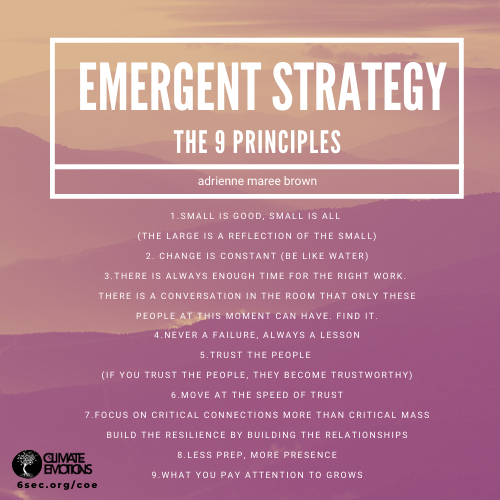
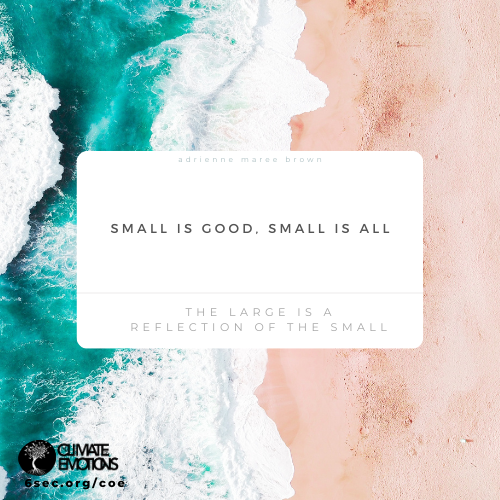
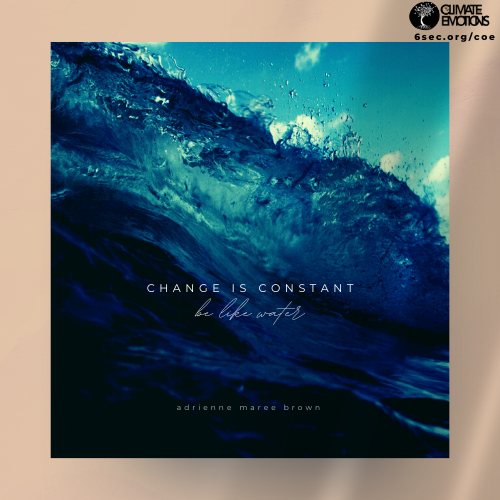

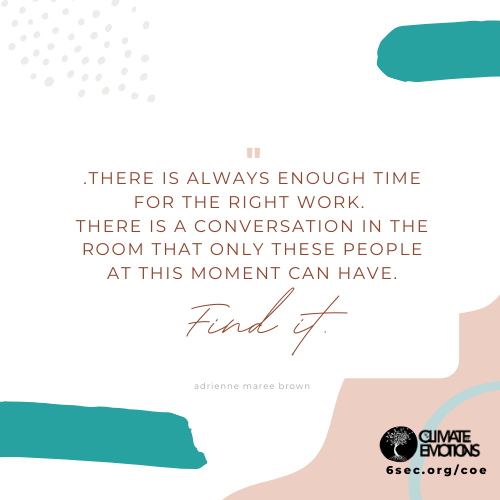
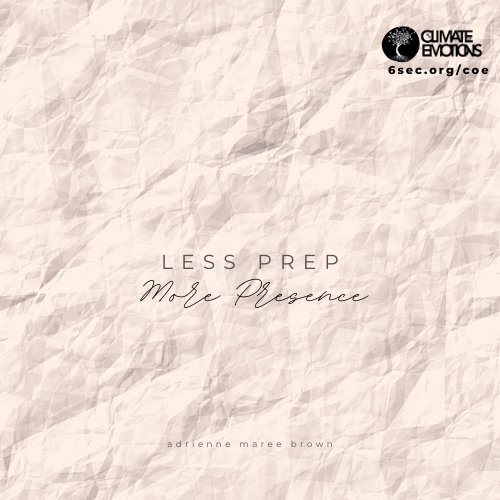
Hi Josh, this is Yvonne from China. Nice to see you again. Appreciated for your nice sharing. I just enrolled into an on-line program-Emergence Leadership of Pacific Integral (USA). Your sharing helps me to understand what emergence is about from EQ perspective, and build connection with EQ and Emergence. Will love to share with you more afterwards. Good day~